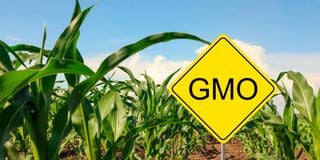We need to address food insecurity but must first end misinformation

The Environment and Land Court has dismissed a petition by Law Society of Kenya (LSK) challenging the lifting the ban of Genetically Modified Organisms (GMO) foods.
Kenya’s food insecurity is as old as its independence. First President Mzee Jomo Kenyatta committed to fighting disease, ignorance and hunger, the three major problems that affected Kenya then; 60 years and five presidents later, hunger is still our biggest national challenge.
Kenya is home to many international aid and development organisations that provide periodic reports on the country’s food security status. Coupled with the government’s internal information, there is consensus that the country is a food-insecure nation. And recently, Macharia Gaitho, one of Kenya’s renowned journalists, penned an article requesting the government to address the country’s food insecurity.
The government has taken a bold step in subsidising production by providing affordable fertiliser, but Mr Gaitho says this will not bring food self-sufficiency. While I agree with his views on addressing food insecurity, I disagree with his mischaracterisation of genetically modified (GM) crops. He adds that the safety of GM foods will still be questionable regardless of the lifting of the 10-year ban.
As a biological scientist, I must categorically say that there are no issues with the safety of GM crops; there is no substantive scientific data that states otherwise. Most reported anti-GM outbursts are founded on myths and unsound scientific reports. For a sober discussion about food insecurity, we must also have a healthy conversation about GM foods.
A report by the Alliance for Science found that, from October last year to January, there were 376 articles published by Kenyan media on GMOs. About 151 pieces (40 per cent) of these contained unchallenged damaging misinformation on GM foods. That primarily focuses on human health (80 per cent), scientific consensus (10 per cent), consumer access (4 per cent) and soil health (3 per cent).
Safety concerns
This vast damaging misinformation on human health likely fuels safety concerns.
Dr Sheila Ochugboju, the executive director of the Alliance for Science, speaks passionately about the negative effects of misinformation regarding GM foods. She is worried that it creates a challenging environment for making informed decisions about the application of genetic engineering in agriculture.
This will hamper Kenya’s progress towards food security, she says, reiterating that there is a robust scientific consensus that using genetic technologies to breed crops has no additional risk compared to old approaches.
It is crucial to counter such narratives as Mr Gaitho’s with reliable scientific evidence.
The process of making GM crops is highly regulated and follows specific laws and principles with quality control checkpoints. Why would a profit-making corporation and scientists spend vast resources to make unsafe food? And why would regulators approve unsafe products for human consumption?
Many regulatory bodies—including the National Biosafety Authority, Kenya Plant Health Inspectorate Service, Kenya Bureau of Standards and the Pest Control Product Board—guarantee the safety of the foods we consume. The biggest paradox is, we don’t see such backlash towards other GM products like antibiotics, insulin and recombinant therapeutic proteins used to treat diseases.
Yet, I agree with Mr Gaitho’s comments on the power dynamics and the inequities propagated by multinationals. Given the negative public image of most of them, there is an enormous mistrust towards their products.
Let the government address these concerns for us to benefit from genetic engineering technologies by empowering and funding local scientists and institutions to take advantage of them. That will give Kenyans a sense of ownership, control and accountability.
Institutions such as Africa Harvest, ILRI, Icipe, Kalro and Kenyatta University are employing technologies targeting crops such as cassava, bananas, sorghum and maize. Even as we proactively act to solve the problem of food insecurity, we must be cautious about our sentiments and opinions.
The media have a more crucial role: As the social watchdog to ensure their communication is accurate, responsible and verifiable.
Dr Oria, PhD, is a LEAD Fellow, Prof Janine Erler Research Group, Biotech Research & Innovation Centre, University of Copenhagen, Denmark.




